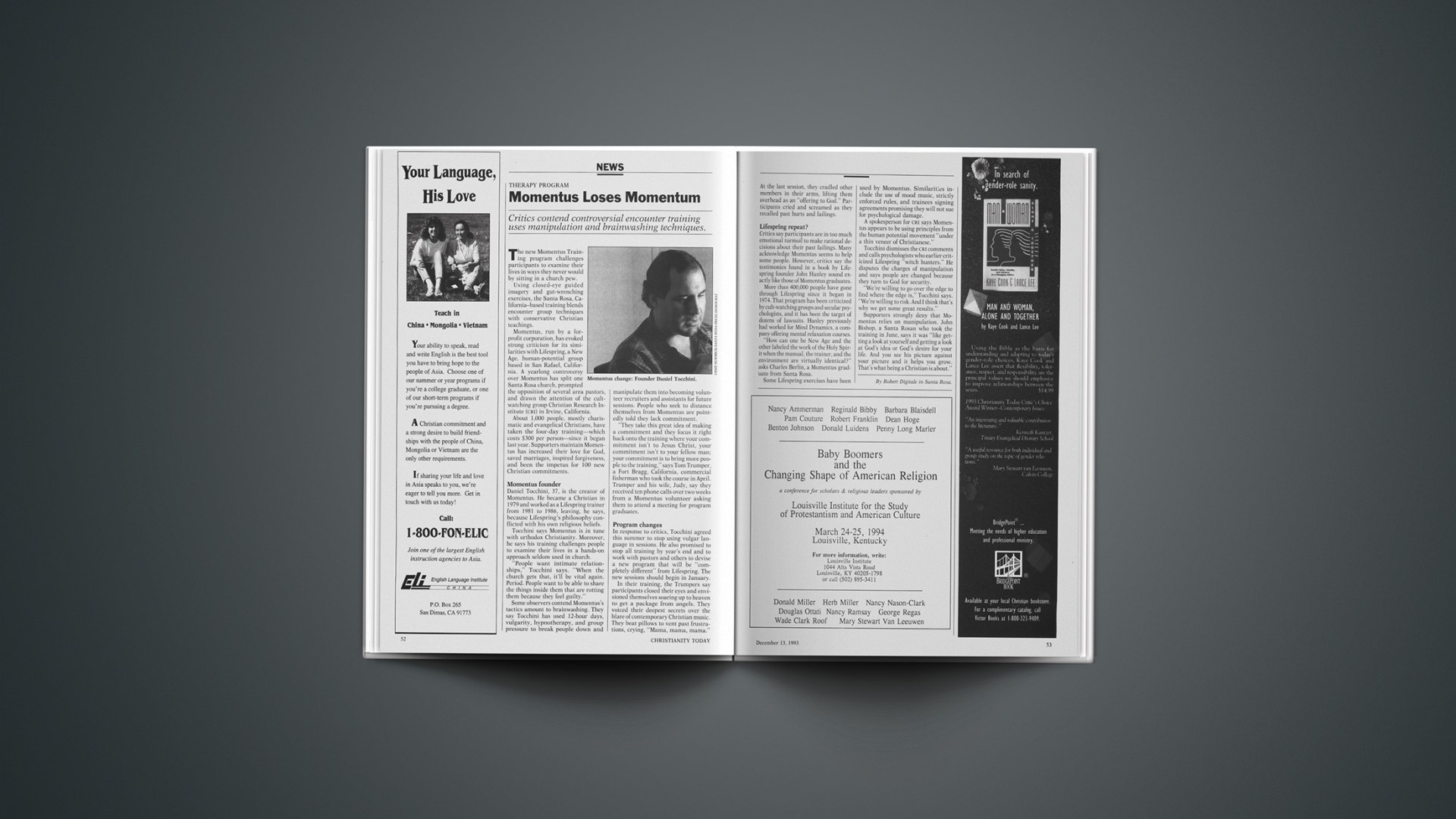Critics contend controversial encounter training uses manipulation and brainwashing techniques.
The new Momentus Training program challenges participants to examine their lives in ways they never would by sitting in a church pew.
Using closed-eye guided imagery and gut-wrenching exercises, the Santa Rosa, California-based training blends encounter group techniques with conservative Christian teachings.
Momentus, run by a for-profit corporation, has evoked strong criticism for its similarities with Lifespring, a New Age, human-potential group based in San Rafael, California. A yearlong controversy over Momentus has split one Santa Rosa church, prompted the opposition of several area pastors, and drawn the attention of the cultwatching group Christian Research Institute (CRI) in Irvine, California.
About 1,000 people, mostly charismatic and evangelical Christians, have taken the four-day training—which costs $300 per person—since it began last year. Supporters maintain Momentus has increased their love for God, saved marriages, inspired forgiveness, and been the impetus for 100 new Christian commitments.
Momentus founder
Daniel Tocchini, 37, is the creator of Momentus. He became a Christian in 1979 and worked as a Lifespring trainer from 1981 to 1986, leaving, he says, because Lifespring’s philosophy conflicted with his own religious beliefs.
Tocchini says Momentus is in tune with orthodox Christianity. Moreover, he says his training challenges people to examine their lives in a hands-on approach seldom used in church.
“People want intimate relationships,” Tocchini says. “When the church gets that, it’ll be vital again. Period. People want to be able to share the things inside them that are rotting them because they feel guilty.”
Some observers contend Momentus’s tactics amount to brainwashing. They say Tocchini has used 12-hour days, vulgarity, hypnotherapy, and group pressure to break people down and manipulate them into becoming volunteer recruiters and assistants for future sessions. People who seek to distance themselves from Momentus are pointedly told they lack commitment.
“They take this great idea of making a commitment and they focus it right back onto the training where your commitment isn’t to Jesus Christ, your commitment isn’t to your fellow man; your commitment is to bring more people to the training,” says Tom Trumper, a Fort Bragg, California, commercial fisherman who took the course in April. Trumper and his wife, Judy, say they received ten phone calls over two weeks from a Momentus volunteer asking them to attend a meeting for program graduates.
Program changes
In response to critics, Tocchini agreed this summer to stop using vulgar language in sessions. He also promised to stop all training by year’s end and to work with pastors and others to devise a new program that will be “completely different” from Lifespring. The new sessions should begin in January.
In their training, the Trumpers say participants closed their eyes and envisioned themselves soaring up to heaven to get a package from angels. They voiced their deepest secrets over the blare of contemporary Christian music. They beat pillows to vent past frustrations, crying, “Mama, mama, mama.” At the last session, they cradled other members in their arms, lifting them overhead as an “offering to God.” Participants cried and screamed as they recalled past hurts and failings.
Lifespring repeat?
Critics say participants are in too much emotional turmoil to make rational decisions about their past failings. Many acknowledge Momentus seems to help some people. However, critics say the testimonies found in a book by Life-spring founder John Hanley sound exactly like those of Momentus graduates.
More than 400,000 people have gone through Lifespring since it began in 1974. That program has been criticized by cult-watching groups and secular psychologists, and it has been the target of dozens of lawsuits. Hanley previously had worked for Mind Dynamics, a company offering mental relaxation courses.
“How can one be New Age and the other labeled the work of the Holy Spirit when the manual, the trainer, and the environment are virtually identical?” asks Charles Berlin, a Momentus graduate from Santa Rosa.
Some Lifespring exercises have been used by Momentus. Similarities include the use of mood music, strictly enforced rules, and trainees signing agreements promising they will not sue for psychological damage.
A spokesperson for CRI says Momentus appears to be using principles from the human potential movement “under a thin veneer of Christianese.”
Tocchini dismisses the CRI comments and calls psychologists who earlier criticized Lifespring “witch hunters.” He disputes the charges of manipulation and says people are changed because they turn to God for security.
“We’re willing to go over the edge to find where the edge is,” Tocchini says. “We’re willing to risk. And I think that’s why we get some great results.”
Supporters strongly deny that Momentus relies on manipulation. John Bishop, a Santa Rosan who took the training in June, says it was “like getting a look at yourself and getting a look at God’s idea or God’s desire for your life. And you see his picture against your picture and it helps you grow. That’s what being a Christian is about.”
By Robert Digitate in Santa Rosa.










